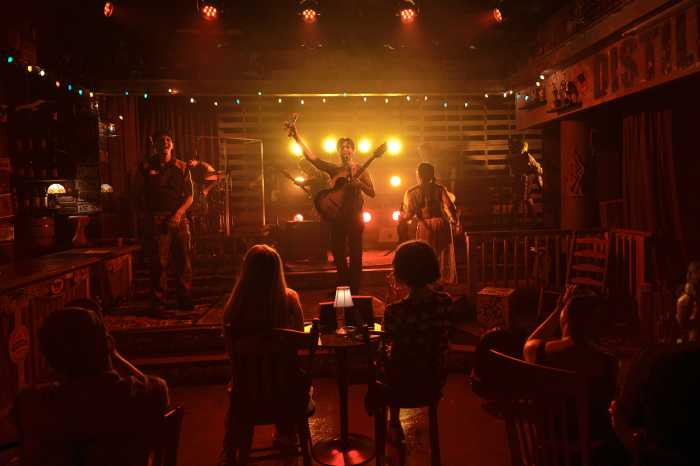Sometimes family ties are so tight they can hurt
Last spring during awards time, Jon Robin Baitz’s “Other Desert Cities” popped up atop many critics’ best play lists. The psychodrama, about a distraught daughter who writes a memoir exposing a foul secret that threatens to tear her family apart, was hailed by the New York Times as “the most richly enjoyable new play in many a season.”
Directed by Joe Mantello, who recently co-starred in “The Normal Heart,” the five-member ensemble boasted such heavy hitters as Stockard Channing, Linda Lavin, and Elizabeth Marvel.
But when the Tony nominations came out, the work was absent because — oh, right — the production was staged at the Mitzi Newhouse Theater at Lincoln Center, an Off Broadway venue. Not surprisingly, the play was nominated for multiple Drama Desk and Lucille Lortel Awards, and won the 2011 Outer Critics Circle Award for Outstanding Off Broadway Play.
Now, the production has alighted on Broadway at the Booth Theatre. And while the creative team remains intact, there are two crucial recastings. The pivotal role of the damaged, truth-seeking daughter, Brooke Wyeth, originated by Marvel, is taken over by Rachel Griffiths in her daring Broadway debut.
Linda Lavin, who played the spent alcoholic Aunt Silda, moved on to a meatier role in another dysfunctional family drama, “The Lyons,” where she has received raves. She is replaced by the equally talented Judith Light, who helped keep “Lombardi” in the game last season.
With these changes, does it still fly? I am happy to report that “Other Desert Cities” not only flies, it soars.
Griffiths is so spot-on that it seems as if Baitz, who created the ABC dramedy “Brothers & Sisters” in which she co-starred, might have written the role just for her. Her portrayal of a depressive, willful daughter bent on taking control of her destiny despite the dire fallout for Polly and Lyman, her WASPy Republican parents (they were pals with the Reagans), is riveting. A bitter bundle of neuroses, Brooke is on the brink of going back into a mental institution, yet Griffiths makes her likable.
Brooke is so furiously detached from her parents she can’t bear to call them Mom and Dad — she uses their first names. A left-leaning longtime resident of New York, this is her first visit home to Southern California in several years.
For her part, Light imbues Aunt Silda with a tragic air of depletion that is at once repulsive and endearing. Now that liquor is banished from her life, the only thing that keeps her going is the promise that Polly and Lyman will finally get their comeuppance once Brooke’s truth is told. But is it the real truth?
The returning members of the ensemble — Channing (as the controlling Polly), Stacy Keach (as the stoic Lyman), and Thomas Sadoski (as Brooke’s younger brother, Trip, a reality show producer) –– deliver flawless, affecting performances.
The bulk of the action takes place in the Wyeths’ Palm Springs home on Christmas Eve 2004. This failed family belongs in an arid desert, that’s for sure.
John Lee Beatty has designed what might be the most exquisite set of the season, capturing the hard sterility of the Wyeth family in the expansive, mid-century modern desert house, rich in textures of sandstone and glass and awash in a riot of beiges and tans.
Even the matching Christmas tree is artificial; it could have been purchased at Neiman-Marcus with the ornaments already attached. The only warmth emanates from a stylish, Danish flying-saucer fireplace that has a real flame, though keeping it stoked seems to be a bother.
The soft, moody lighting, by Kenneth Posner, perfectly evokes the transition from day to night. The unseen pool outside is suggested by a reflection of water onto the double-height ceiling of the dining room. An inspired detail.
The central point of dramatic tension — will Brooke go through with her plans to publish the tell-all about the tragic loss of her radical older brother, Henry, and her parents’ potentially scandalous role in it? — is superbly realized. Days later, I am still wondering what I’d do if I were in her shoes.
Naturally, “Other Desert Cities” has got deeper issues on its mind than will she or won’t she. It’s about self-preservation at any cost, honoring (or dishonoring) thy mother and father, the hypocrisy of political correctness, and the multiple sides of truth and its consequences. It probes the divide between parents and children, East coast and West, liberals and conservatives, and even money and happiness.
Although some of Baitz’s plays (“Three Hotels,” “The Substance of Fire”) were critical hits Off Broadway, this is his first original work produced on Broadway. He also adapted “Hedda Gabler,” which was staged on Broadway in 2001 starring Kate Burton.
Look for the gorgeously articulated “Other Desert Cities” to be a contender at the Tonys this spring.
The original online version of this review mistakenly identified which staging of “Hedda Gabler” Jon Robin Baitz adapted.
Essentials:
OTHER DESERT CITIES
Booth Theatre
222 W. 45th St.
Tue. at 7 p.m.; Wed.-Sat. at 8 p.m.
Wed., Sat. at 2 p.m.; Sun. at 3 p.m.
$56.50-$126.50; telecharge.com
Or 212-239-6200

































